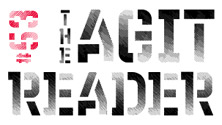by Doug Elliott
It would be easy to sweep bands like the Cultural Decay and 13th Chime, the first two groups with the privilege of being rats in the Sacred Bones Records reissue laboratory, under the Joy Division–copycat rug and be rid of any discourse. Each band’s sound could be linked to any of the behemoths from the era, from Warsaw to Cabaret Voltaire to the Boys Next Door. But post-punk in Europe was never easy, and the discoveries of cult bands from Manchester to the Eastern Bloc seem to multiply as our thirst for vintage existential rock deepens. And there is always more to each group than what is on the surface.

At least Caleb Braaten of Sacred Bones thinks so. These groups do fit into the label’s catalog quite nicely, and he gives them the royal Bones treatment complete with nice matte sleeves and oversized booklets. What you have here are two unrelated bands dotting the industrial Euro landscape at the same time, around 1980. The Cultural Decay came from Belgium and 13th Chime from Haverhill, an “overspill” town east of London. And while the Chime may have had the slightly larger following during their time, the Cultural Decay seem to have drawn more posthumous attention, which is why they also get a CD treatment (both titled Eight Ways to Start a Day) crammed with just about every recording, demo and studio, the band completed.
On first listen, the Cultural Decay don’t really have any extraordinary facets to contribute. Their first single (“Brave New World” b/w “End of the Corridor”) is a solid coldwave one-two punch, complete with futuristic/apocalyptic lyrics, single-note synth lines and dry, punchy drums. Good stuff. Their only other release, a 12-inch EP, was even better, revealing a band unafraid to delve into the festival acid-rock they surely grew up on. Imagine a sort of post-punk version of Barrett-era Floyd, jamming away for minutes, constant interplay between the guitarist, between the rhythm section, with Lydon-esque vocals chiming in from time to time about consumerism or something of that nature. The previously unreleased demos are regular séances, stripped of the cold, modern façade the band hoped to portray onstage. A tune like “Thin Rope” is welcoming, even sadly touching, while the dreary moods of “Exit Calls” and “Womb” sound more human than their studio efforts. All of it amounts to an interesting look into the psyche of a coldwave group seemingly existing for themselves and few others.

The package for 13th Chime is a little easier to digest, even if the music contains a bit more baggage. Featured on The Singles: 1981–1983 are the band’s three singles, plus three previously unreleased tracks. Given their early goth sound and macabre imagery it surprises me that the Chime never reached a bigger audience. Their sound stands out among even the bigger, similar-minded groups of the era, from the Cure to Birthday Party. Singer Mick Hand’s accent is thick and affected, a plus in my eyes, and the band keeps things simple and powerful. Their debut single should’ve been one of the classics of the era. “Cuts of Love” features fuzz guitars, a perfect little descending stutter chorus and an echoed drum sound. It doesn’t try too hard to be spooky, and Mick’s vocals are just whiny and bored enough to keep him singled out. “Coffin Maker” follows a similar formula, like a B-side should, only to turn the dramatic up a notch as it drags by on its gray cloud. Their next single featured two single-chord romps to go with the leather and spikes they were sporting. The Chime’s material begins to trail off with the second half of their final single, so maybe there’s your answer to why these guys couldn’t draw more of a crowd. Or it could be a bit of an identity crisis, as the band feels a lot less scary than their look wanted to be, and from the stories in the liners, they seem like a nice group of chaps. Could it be that the coffins and blood got in the way of their truest calling? We will never know, as the fate of 13th Chime is now sealed inside a Sacred Bones record, awaiting judgment.
PRIMITIVE FUTURES
Pink Noise, FNU Ronnies, caUSE co-MOTION
Ducktails, Ducktails
Introducing... Ganglians
TV Ghost and Black Lips Club Singles
Introducing... The Beets
Captured Tracks
Psychedelic Horseshit, Golden Oldies
The World's Lousy With Ideas Volume 8
Singles Club Catch-Up
Introducing... Fungi Girls
Sacred Bones Spring '09 Singles, Part II
First Installment in the Hozac Hookup Klub
Novak Goes Solo (Again)
Sacred Bones Spring '09 Singles
